It’s been nearly 30 years since a blockbuster won the big prize at the Academy Awards. The year Titanic won, in 1998, 57 million people tuned in for the awards show. Compare that to the 10.4 million who watched the 2021 ceremony, the year after Covid sunk the theatrical movie business, and you can see why there’s so much build up around this year’s big night.
The Barbieheimer blitz not only brought people back to theaters around the globe, it delivered two Best Picture nominations. Will it translate to bringing more people back to live network television for a communal event?
It matters as we’re all increasingly fragmented into tiny asynchronous viewing bubbles, and our shared experiences and conversations have become fewer and farther between. The return of theater goers could help drive the return of Academy Awards night viewers, and the Oscars are that rare chance to watch something with everyone else.
So to prepare you for the big night and the aftermath conversations, here’s a quick Watercooler guide to keep you up on the 10 films up for Best Picture.
American Fiction

The Story: Fed up with the literary world’s reliance on offensive Black stereotypes, a frustrated novelist pens a novel lampooning the genre, which ironically becomes a massive hit.
Nominated for: Best Picture, Best Actor (Jeffrey Wright), Best Supporting Actor (Sterling K. Brown), Adapted Screenplay, Original Score
Conversation Starters: As a published writer of color and an MFA student reading other writers of color, I found the film eerily accurate when it comes to its depiction of the publishing industry. While the media insists it wants diverse voices, the meaning of diversity and how its represented remains dangerously narrow. As for the awards chatter: Jeffrey Wright’s nomination for Best Actor is a long time coming, and his portrayal of Monk is quiet while capturing so much of his exhaustion with subtle facial shifts. Sterling K. Brown’s nomination for playing Monk’s recently out of the closet surgeon brother came as a surprise to prognosticators, which proves that while publishing may still be predictable, the Oscars can still surprise us. Where to watch it: Currently only in theaters.
Anatomy of a Fall

The Story: After Samuela Maleski is found dead outside his house by his blind son, inconsistencies in his autopsy suggest he was not the victim of a tragic fall from a window…and his novelist wife becomes the chief suspect.
Nominated for: Best Picture, Best Actress, Directing, Film Editing, Original Screenplay
Conversation Starters: On the surface, it’s a murder mystery wrapped in a legal drama. But Anatomy of a Fall probes deeper questions about marriage and the blur between truth and fiction, and it introduces a thought-provoking twist on the idea that “justice is blind.” Throughout the film, you’ll wonder if our heroine did everything she could to help her husband in their marriage, and did he do everything to help her? Or did their marriage suffer from one big communication breakdown? Despite its two and a half hours, Anatomy of a Fall moves at a brisk pace, propelled by rapid-fire dialogue and tension-filled courtroom scenes. Without giving too much away, you’ll leave the film wondering just how ethical autofiction is. Awards Chatter: Considering its a French film with relationship themes and a relatively small marketing push, Anatomy of a Fall is one of the Best Picture underdogs. But dark horses from overseas have surprised everyone before. Where to stream it: Available for rent on Amazon and Apple
The Holdovers

The Story: Set in 1970s New England at an upscale boys boarding school, unpopular teacher Paul Hunham (Paul Giamatti) is assigned to oversee students staying on campus over the holidays. He ends up bonding with the school’s chef, Mary (Da’Vine Joy Randolph), and his most troublesome student, Angus (Dominic Sessa).
Nominated for: Best Picture, Best Actor, Best Supporting Actress, Film Editing, Original Screenplay
Conversation Starters: Though it leans more into comedy than drama, Randolph brilliantly captures the soul of a grieving parent during the Vietnam era, and she does so without overdoing it. Giamatti is delightful as the curmudgeonly Paul, but he also shows a softer side when trying to mentor Angus. Our critic Felipe Patterson described it as “a cross-generation watch that will tug at your heartstrings as it wrestles with deeper themes — and ultimately nurturing your hope.” Considering the state of the world, that could be the surprise that Oscar voters embrace. Where to stream it: Peacock
Killers of the Flower Moon
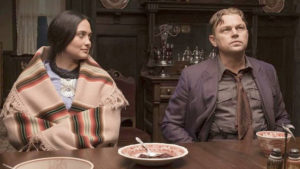
The Story: Set in 1920s Oklahoma, Killers of the Flower Moon focuses on the real-life Osage murders. Based on the book of the same name by David Grann, the film takes a more personal approach to the tragedy.
Nominated for: Best Picture, Best Supporting Actor, Best Actress, Cinematography, Costume Design, Directing, Film Editing, Original Score, Original Song, Production Design
Conversation Starters: It has sparked a sharper awareness of the issues facing indigenous people, historically and today, as our interviews with cast members TaNae Collins and Tatanka Means revealed. Killers of the Flower Moon could have easily turned into a white savior story, but Scorsese centered the story on Mollie (Lily Gladstone – up for Best Actress), an Osage woman who falls in love with a questionable outsider (played by Leonardo DiCaprio). Gladstone infuses Mollie with a remarkably quiet strength; regardless of what tragedy befalls her, she stands taller. A passion project for Scorsese, he took the time to properly research the Osage and employed several Osage consultants. It shows—Killers of the Flower Moon respects the Osage and highlights how horrific this tragedy was. It also draws parallels to another dark chapter of history that occurred nearby, the Tulsa Massacre. “As a Black male with an understanding of the historical context surrounding the Massacre, I found myself deeply moved, almost to tears, watching the Osage people’s plight in the film,” Felipe Patterson shared in his review for the Watercooler. While the Best Actress oddsmakers have Gladstone and Emma Stone neck and neck, the question remains whether Scorsese will take home an Oscar for Directing, despite breaking the record with 10 career nominations, and so far just one win (The Departed). At 81, will the Academy pay him the respect he’s due? Where to stream it: Apple TV+
Maestro

The Story: A kinetic, inventive biopic about the legendary conductor, composer, pianist, and humanitarian Leonard Berstein (Bradley Cooper) that focuses on his relationships, in particular his relationship with his wife, Felicia Montealegre (Carey Mulligan).
Nominated for: Best Picture, Original Screenplay, Best Actor, Best Actress, Cinematography, Makeup and Hairstyling, and Sound.
Why it’s relevant: As cinematic experiences go, Maestro is mesmerizing, capturing the intensity and majesty of Bernstein’s talents and the symphonies he led and dropping us inside of the glamorous world of a larger than life icon. It’s also a love story unlike any other, as it focuses on Bernstein’s enduring marriage and family life as well as his relationships with men. Carey Mulligan is up for a well-deserved Oscar for capturing the conflicted emotions of the actress Montealagre, who knew her husband was bisexual before she married him, but continued to wrestle with “sacrificing herself at his altar.” As for its Oscars contention, Maestro has been up for all of the precursor awards, but largely shut out of the major categories, which might come down to the fact that it lacks the larger scope and important history lessons of films like Oppenheimer and Killers of the Flower Moon. The question remains whether any tides will take a surprise turn for the Oscars — and if Cooper will reprise his role in a musical performance during the ceremoney. The film marks Cooper’s second time behind the director’s chair (the first was A Star is Born) and several critics were wowed. For ABC News Peter Travers wrote, “Like Bernstein, he (Cooper) brings everything he’s got to the dream assignment, using all the tools of cinema, from editing to revolutionary sound design, to do Bernstein proud.” Where to stream Maestro: Netflix
Oppenheimer
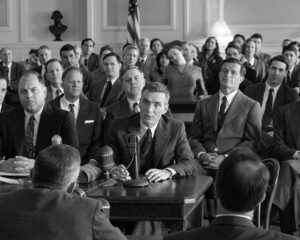
The Story: Based on the book American Prometheus by Kai Bird and Martin J. Sherwin, Oppenheimer tells the sweeping story of J. Robert Oppenheimer (Cillian Murphy), who led the Manhattan Project, designed to create weapons massive of mass destruction and lead the Allies to victory during World War II.
Nominated for: Best Picture, Best Actor, Best Supporting Actor, Best Supporting Actress, Cinematography, Costume Design, Directing, Film Editing, Makeup and Hair Styling, Original Score, Sound, Adapted Screenplay, Production Design
Why it’s relevant: After sweeping many of the precursor awards shows, Oppenheimer is favored to win the big prize this year. The historical drama has the most Oscar nominations (a whopping thirteen!), and director Christopher Nolan, lead actors Cillian Murphy, and Robert Downey Jr. have all been taking home trophies from the Globes, SAG Awards, and DGAs. Defying a traditional hero’s arc narrative, it is “a film about the decimation of a man’s soul” as the Watercooler’s Aaron Cohen notes in his review. One major problem critics have had with the film is the screenplay, which was described by The New Yorker’s Richard Brody as “a movie-length Wikipedia article.” While that assessment doesn’t bode well, the film is still a sweeping, riveting, and important story with heart-wrenching portrayals from a wide ranging cast, all of which have overshadowed Oppenheimer’s biopic problems. And at a time when we are facing constant news about war and its escalations, Oppenheimer is a timely treatise on the importance of learning from history. Streaming: For rent on Apple TV+ or Amazon
Past Lives

The Story: Nora (Greta Lee) and Hae Sung (Teo Yoo) are childhood buddies in South Korea. But when Nora’s family immigrates to Canada, their friendship comes to an end. That is until they are reunited two decades later in New York City.
Nominated for: Best Picture, Original Screenplay
The Conversation: It’s rare for a smaller romantic drama like Past Lives to earn a Best Picture nomination, and even more unlikely given that half of the film is in Korean. Yet the draw of this movie speaks to something bigger that resonates with so many right now. It’s a quiet meditation on the choices we make and the pull of our past — the one we remember and the one we descend from. Lee perfectly captures the feeling of being lost between two worlds, or more specifically, being certain that everything in your life is in its perfect place only to realize that maybe it isn’t. Writing for Time, Stephanie Zacharek muses that “Somewhere between the right and the wrong decision is the choice we learn to live with, a sea of joy and sadness and everything in between.” Where to stream it: AppleTV+ or Amazon
Poor Things
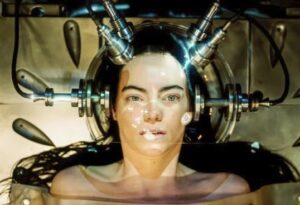
The Story: Based on the novel by Alasdair Gray, this alternate take on Frankenstein’s monster follows Bella (Emma Stone), a Victorian woman who has been resurrected from the dead. Her creator (Willem Dafoe) wants to coddle her while his assistant (Ramy Youssef) wants to marry her. Bella wants to explore the world, so she runs off with slick lawyer Duncan Wedderburn (Mark Ruffalo) who quickly learns Bella is far more rebellious than he initially thought.
Nominated for: Best Picture, Best Actress, Best Supporting Actor, Costume Design, Directing, Film Editing, Makeup and Hairstyling, Original Score, Production Design, Adapted Screenplay
Why watch it: Director Yorgos Lanthimos’s work has always been weird, but Poor Things takes “weird” to a new dimension. Yet it’s a delightful form of weird, with a vibrant steampunk aesthetic and a playful and funny no to its inspiration — Frankenstein. Emma Stone brilliantly portrays Bella’s innocence and vulnerability as a revived creature whose unformed mind must start over. She nails every line, a difficult task since Bella has no filter. There has been some debate over just how feminist Poor Things is, one that I think depends on how exactly you define feminism. But as our own critic Felipe Patterson wrote, “Poor Things is one of those rare cinematic experiences that surprises and entertains as it challenges you.” But will it prove to be too challenging for Academy members? We’ll see.
Where to watch it: Currently in theaters
The Zone of Interest
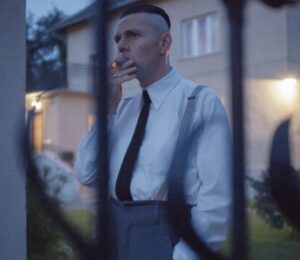
The Story: Nazi Rudolf Hoss (Christian Friedel) lives next to a concentration camp. But he and his wife Hedwig (Sandra Huller) won’t let that stop them from building their dream life.
Nominated for: Best Picture, Directing, International Feature, Sound, Adapted Screenplay
Why it’s relevant: The film Steven Spielberg has described as the best holocaust movie since his Schindler’s List, it’s also been described as a perverse version of Macbeth. Rudolf is controlled by Hedwig, who relishes in the goodies her husband strips away from prisoners. Unlike the book its based on by Martin Amis, where the Hoss’s were fictionalized, this version pulls from research on the real-life family. What makes The Zone of Interest different from other Holocaust fare is the fact that we don’t see the atrocities; we simply hear them. Instead, we see this world through the Hoss’s eyes on the other side of the wall, as they flat-out refuse to acknowledge the horror they are inflicting. Where to stream it: Apple TV or Prime Video
Barbie
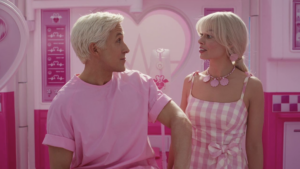
The Story: Barbie (Margot Robbie) is living her best life in Barbie land, where every day is sunshine and cotton candy colors. The same cannot be said for Ken (Ryan Gosling), who only has a good day when Barbie looks at him. But when Barbie and Ken journey to the real world, she learns that life for real-life women isn’t so rosy, and Ken discovers the patriarchy.
Nominated for: Best Picture, Best Supporting Actor, Best Supporting Actress, Costume Design, Original Song, Production Design, Adapted Screenplay
Conversation starters: There is a certain irony that a film focused on how difficult it is to be a woman and the struggles against the patriarchy failed to garner either its female director (Greta Gerwig) or lead actress (Robbie) an Oscar nod. Instead, “Just Ken” Ryan Gosling received one, and as he noted, “There’s no Barbie movie without Barbie.” Putting these injustices aside, Barbie is deeper than it appears, a resonant look at some of the challenges of modern-day womanhood. All of it comes wrapped in a playful, imaginative production that brings all of the Barbies bubblegum-colored dreamworlds to life, blowing the minds of every woman’s inner child. Perhaps Gerwig and Robbie didn’t fawn over the Academy’s elder statesmen enough. But now that they’ve proved the film’s larger point, even more viewers will be watching the film for years to come. Suck on that, patriarchy ;}. Where to stream Barbie: Max


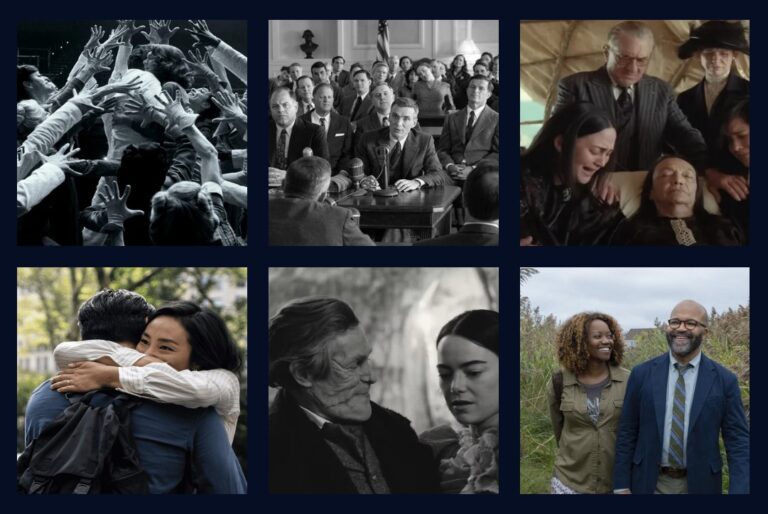
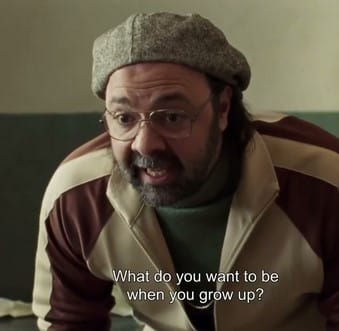

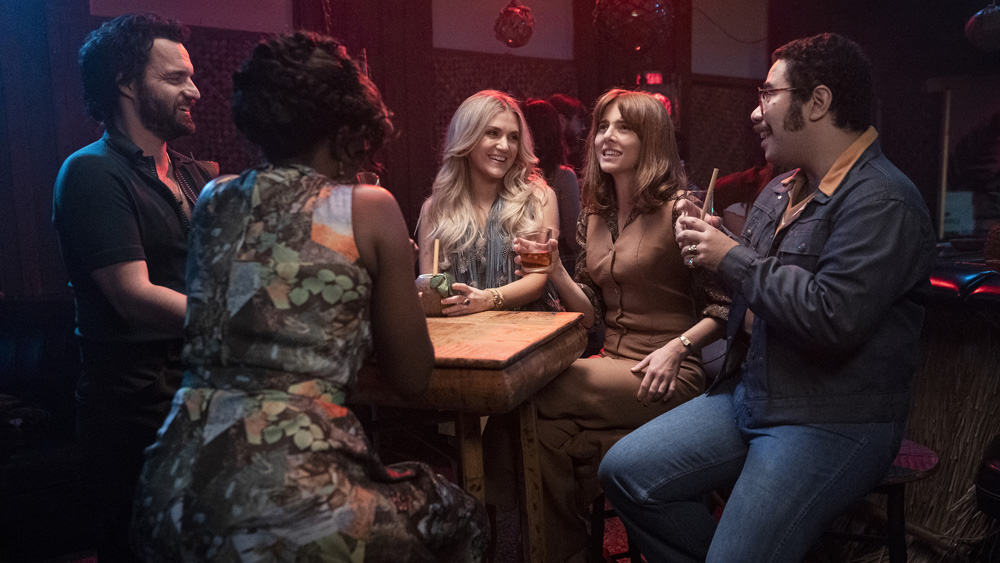
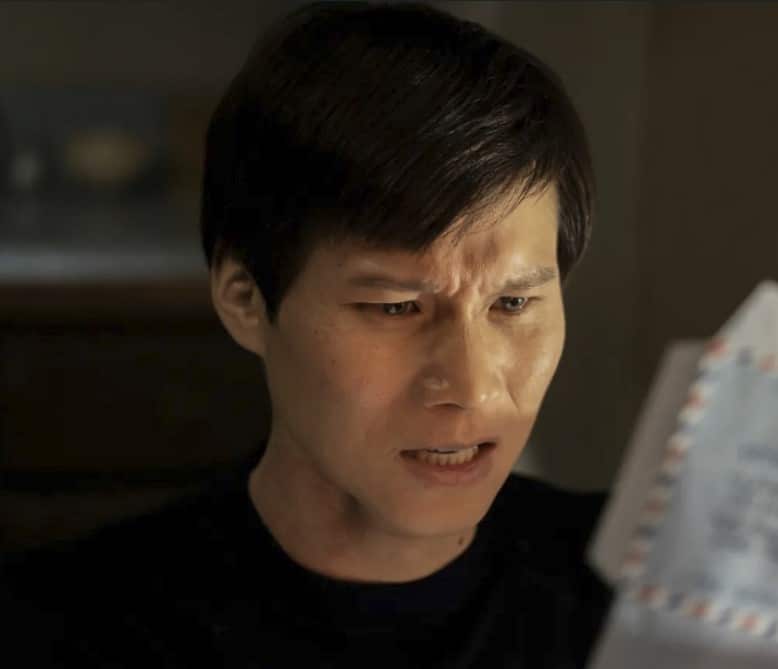


Start a watercooler conversation: